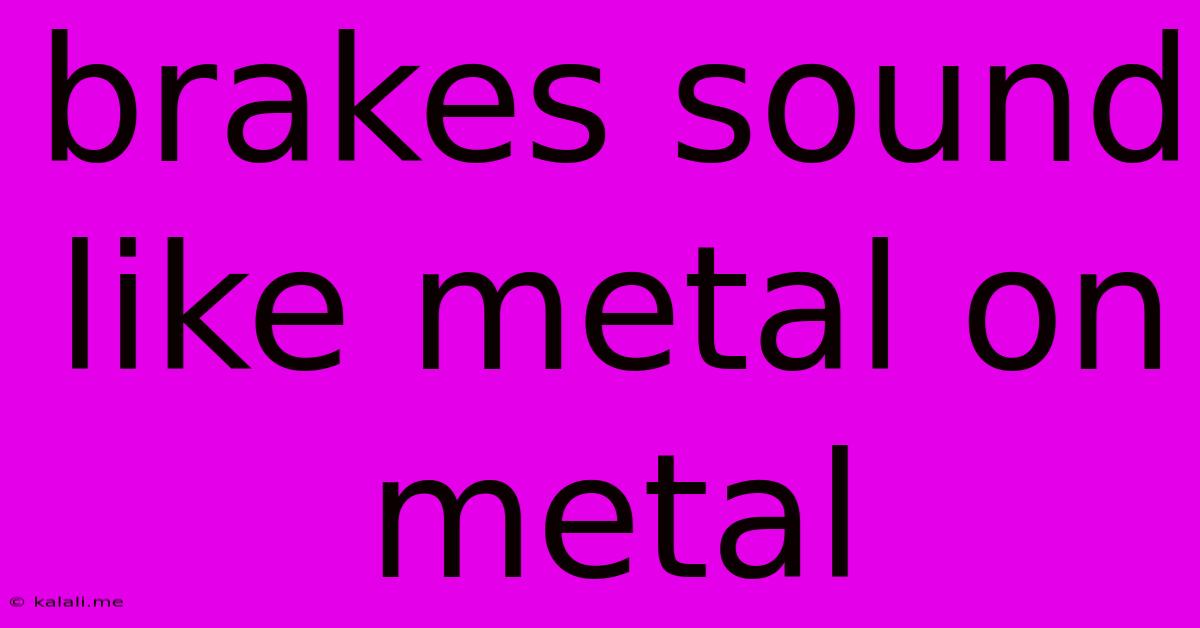Brakes Sound Like Metal On Metal
Kalali
May 25, 2025 · 3 min read

Table of Contents
That Grinding Sound: Why Your Brakes Sound Like Metal on Metal
Hearing a grinding noise coming from your brakes? It sounds like metal on metal, and you're understandably worried. This isn't just an annoying sound; it's a serious indication that your braking system needs immediate attention. Ignoring this could lead to brake failure, a potentially dangerous situation. This article will explore the common causes of that terrifying metal-on-metal brake sound, helping you understand the problem and take the necessary steps.
Common Causes of Metal-on-Metal Brake Noise
Several factors can cause your brakes to make that alarming grinding noise. Let's break down the most frequent culprits:
-
Worn-out brake pads: This is the most common reason. Brake pads are designed to wear down gradually. When they're completely worn, the metal backing plate of the pad comes into contact with the rotor (the spinning metal disc), creating that unmistakable screeching sound. This is often accompanied by a noticeable vibration in the brake pedal. Ignoring this is extremely dangerous.
-
Worn-out rotors: While brake pads wear down faster, rotors can also wear thin over time, especially with aggressive braking or harsh driving conditions. Thin or damaged rotors can lead to uneven contact with the brake pads, producing a grinding sound, especially during braking. They may also exhibit scoring or grooves on their surface.
-
Foreign objects: Sometimes, small stones, pebbles, or other debris can get lodged between the brake pad and the rotor. This can cause a grinding or scraping sound that mimics metal-on-metal contact. This is usually a less severe issue than worn components, but it still requires attention.
-
Caliper issues: Brake calipers are responsible for applying pressure to the brake pads. A faulty or seized caliper can cause uneven pressure on the pads, leading to premature wear and a grinding noise. Sometimes, a sticking caliper piston can also cause this.
-
Parking brake engagement: If your parking brake (emergency brake) is slightly engaged, it can cause friction and a grinding noise, especially at low speeds. This is often accompanied by a noticeable dragging sensation.
What to Do if You Hear Grinding Brake Noise
Don't delay! A metal-on-metal grinding sound from your brakes is a clear warning sign that requires immediate action. Here's what you should do:
-
Avoid harsh braking: Drive cautiously and avoid any sudden or hard braking to prevent further damage.
-
Schedule an inspection: Take your vehicle to a qualified mechanic or auto repair shop for a thorough inspection of your braking system. They can diagnose the exact cause of the noise and recommend the necessary repairs.
-
Don't attempt DIY repairs: Brake systems are complex, and attempting DIY repairs can be dangerous. Leave it to the professionals to ensure your safety.
Preventing Future Brake Problems
While brake wear is inevitable, you can take steps to prolong their lifespan and reduce the risk of experiencing that unpleasant metal-on-metal sound:
-
Regular brake inspections: Have your brakes checked during routine maintenance or if you notice any unusual sounds or vibrations.
-
Smooth braking techniques: Avoid harsh braking as much as possible.
-
Proper maintenance: Ensure your vehicle receives regular maintenance, including brake fluid flushes and inspections.
Ignoring that grinding sound could lead to brake failure, putting you and others at risk. Prioritize your safety and get your brakes inspected immediately. The cost of repair is far less than the potential cost of an accident. Remember, your brakes are your safety net—keep them in top condition.
Latest Posts
Latest Posts
-
Best Terminal For Connecting To Cluster
May 26, 2025
-
Shut Off Valve For Fridge Water Line
May 26, 2025
-
Feat That Increase Bow Range 5e
May 26, 2025
-
3 Lights 3 Switches Into One Light Switch
May 26, 2025
-
How Many Tablespoons Of Yeast In A Package
May 26, 2025
Related Post
Thank you for visiting our website which covers about Brakes Sound Like Metal On Metal . We hope the information provided has been useful to you. Feel free to contact us if you have any questions or need further assistance. See you next time and don't miss to bookmark.